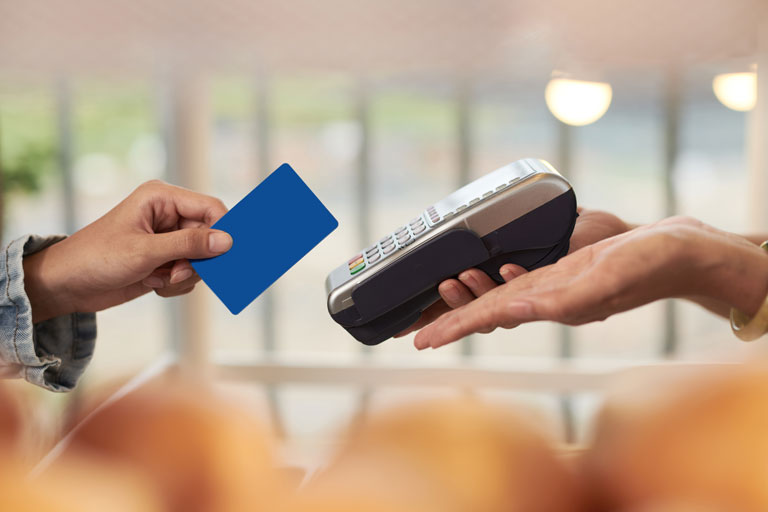When you are establishing your business, one of the first steps you’ll probably want to make is to establish a merchant account. A merchant account is a specific type of business bank account that allows a business owner to accept credit and debit card transactions, one of the key benefits of merchant services.
The merchant processor you choose will capture a fee for every card transaction and link the sale to your checking account. The credit criteria for a merchant account will vary depending on the payment processor.
But you can expect that as a business owner, they will check your credit before approving a merchant account. This is to help protect them against risks such as fraud or chargebacks, for example.
In addition to your credit report, the merchant underwriter will likely be interested in other information about your business such as:
- License and incorporation documents
- Bank statements
- Processing statements from past underwriters if applicable
- Access to the fine print on your return and refund policies
- Any historical chargebacks
When a business owner has bad credit this makes obtaining a merchant account tricky but not impossible. The good news is that merchant processors may at times relax their standards toward business owners with less-than-stellar credit if everything else lines up or for higher fees. If you are wondering, ‘Can I get a merchant account?’, keep reading.
In this article, we will explore ways to secure a merchant account even if your credit score falls on the lower side of the spectrum.

What Is a Merchant Account?
If you are wondering, ‘What is a merchant,’ let’s clarify this point first. A merchant is an individual or business responsible for selling goods and services. With a merchant account, credit card processing becomes possible. It is what allows businesses to accept electronic payments, including debit and credit cards, the most popular payment method among consumers.
For example, in 2021, nearly three-quarters of consumers chose to complete transactions using a debit or credit card, while globally, merchants complete more than 1 billion credit or debit transactions daily. Without a processing merchant account for credit and debit card sales, a business is at a serious disadvantage from a competitive standpoint.
If you have a personal credit score under 580 (in some cases under 619) or have filed for bankruptcy, you are likely to fit the description of a business owner with bad credit despite needing a merchant account.
Keep reading to learn what you can do about needing a merchant account despite having bad credit.
Credit Overview
With merchant services, no credit check is gone unnoticed. It’s an important step to consider.
However, before we get into what steps to take to get a small business merchant account with bad credit, let’s establish the credit landscape. The credit score a merchant processor sees will depend in part on the structure of your business. If you are set up as an LLC or C-Corporation, your employer ID number should be attached to your business.
In this case, a merchant processor is likely to check your credit score to prove that you are, in fact, the business owner. You can obtain your employer ID number from the U.S. Internal Revenue Service (IRS), which will pave the way for you to accept credit and debit card payments.
Another thing to consider is merchant account underwriting, where the provider might complete either a soft or hard credit check on the business owner. The merchant processing application will trigger a soft credit check by the underwriter. The merchant underwriter will use the business owner’s personal details, including their employer ID number and home address, to perform the credit check.
Considering that it is a soft inquiry, the business owner’s credit score is not affected. Basically, the merchant account underwriter is looking to verify that it is a valid business, the business owner is not currently in bankruptcy protection or has any court judgments against them, the home address, and there are no signs of fraud such as money laundering or terrorism funding.
Once you find a merchant processor willing to work with you despite bad credit, be prepared to pay. This is because your credit score could influence what is known as the discount rate, the rate that you are responsible for paying for the processing of credit and debit cards.
When a customer pays by card, a discount rate, which is expressed as a percentage of the transaction amount, is taken from the total and directed to the merchant processor. So the lower the discount rate, the more you, as the merchant, get to capture from the transaction. Someone with a credit score that is considered poor — in the 580-619 range or lower — can expect to have to pay a higher discount rate to the merchant processor.
The good news is that you can establish yourself as a good customer with the processor over time, which can work to your benefit. To do this, take the following steps:
- Bolster security to avoid credit or debit card fraud
- Sign up for address verification for the sale of big-ticket items
- Don’t change processors. Instead, negotiate with the one you have to tweak the discount rate.
Even if you have a higher-than-average discount rate today due to poor credit, it could potentially be lowered down the line.

Start With Your Bank
Now, let’s explore exactly how to get a business merchant account. If you need one but could use better credit, you should not just apply with any merchant underwriting processor. This process is random and could prevent you from experiencing merchant account benefits. Instead, start with the financial institution at which you have an existing checking account for your business. This will increase the chances of your getting approved for a merchant account.
The first thing to do is inquire with your bank to make sure that they offer merchant accounts, to begin with. They may be willing to provide you with a merchant account even with a bad credit score. If your existing accounts with the bank are in good standing, they may be willing to look the other way on your poor credit and issue you a merchant account anyway.
In addition, you may find that any processing fees, monthly fees, or startup expenses associated with opening a merchant account will be lower if you stick with the financial institution that handles your business checking account.
Do Your Own Research (DYOR)
If your current bank doesn’t offer merchant accounts, now is not the time to give up. It’s time to keep digging. This also means don’t sign up with the first merchant processor that comes along. Instead, do your own research and consider your options based on your personal situation.
- If your credit score has been hurt by a bankruptcy filing, finding a merchant processor willing to work with you might be challenging at first. Worse, a bankruptcy filing could remain on your credit report for up to a decade. But keep looking because you may be able to find a provider that is willing to give you a merchant account anyway. However, it may cost you as they only approve your account by attaching a higher discount rate than you would otherwise be charged.
- Be aware that the industry in which your business operates could determine your credit profile’s influence on your merchant account decision. Business owners operating in high-risk sectors — such as casino or sports betting, adult entertainment, or drugs/pharma — can expect their credit reports to be examined more closely than a low-risk business.
- Find a merchant processor that specializes in high-risk business accounts. These providers exist, though they are not one size fits all. This means that their credit standards, interchange fees, and processing rates will vary from provider to provider. In addition, many high-risk accounts must understand that next-day funding usually is not available.
The best merchant account for small businesses depends on your specific circumstances. However, for business owners looking for the best high-risk merchant accounts with bad credit, you might want to consider Electronic Cash Systems, PaymentCloud, Payment Depot, Durango Merchant Services, Soar Payments, Emerchant Broker, or PayKings, to name a few.
- If worse comes to worst, you could consider engaging a merchant processor located abroad. This is who some businesses operating in high-risk sectors of the economy turn to because the standards are more relaxed. However, any startup fees and the discount rate are likely to be higher than they otherwise would be.
Also, you can expect that depending on the merchant underwriter you choose, they will have a different process for how to set up a merchant account.

Jump Through Hoops
A merchant account for credit card payment processing will make your life as a business owner easier. While a no credit check merchant account is going to be hard to come by, unless you are using your current bank where you have a business checking account, as previously discussed, there are some hoops you can jump through to secure one.
One of the perks of having good credit is that you might be able to secure a short-term contract with a merchant underwriter, such as one that is month-to-month. If you are a business owner with poor credit, you might still be able to secure a merchant account, but you might have to agree to a longer-term contract of up to several years. The provider might also require that you sign up for automatic renewal. Otherwise, you could be hit with large cancellation fees for terminating the agreement early.
Another thing to consider is there are different types of merchant accounts. For a business owner with bad credit, you could hold off on applying for a full-service merchant account for the time being and instead pursue a more basic account, such as those offered by fintech platforms like Square or PayPal, for example. These options could also be suited for an entrepreneur seeking merchant services with no credit.
Considering that there’s no definite way around the credit check, you could opt for a fintech platform in the short term and then work on your credit in the interim.
When it comes time to apply for a full-service merchant account, try applying to multiple targeted merchant underwriters at once. This will increase your chances of being approved for a merchant services account, even if your credit is a work in progress. And be prepared to wait. Getting approved by a merchant underwriter could take days or even a couple of weeks.
Conclusion
Being able to accept debit and credit cards from a merchant account should help your small business to run more smoothly. While it might be difficult to get a merchant account with bad credit, it is not impossible. In the end, getting a merchant bank account should go a long way toward building a relationship with an underwriter so that you can enjoy better terms in the long run.
To contact sales, click HERE. And to learn more about ECS Merchant Accounts visit Merchant.
